NYFF: Michael Fassbender, Kate Winslet & More Talk Steve Jobs
Last Saturday we attended the New York Film Festival’s (NYFF) powerful panel discussion on and screening of Steve Job in anticipation of the film’s wide release on October 23. Earlier today, as part of our coverage of the Festival, we focused on the insights of screenwriter Aaron Sorkin, director Danny Boyle and author Walter Isaacson.
Today we are turning to the actors – their thoughts in their words. The panelists: Michael Fassbender as the eponymous legend; Kate Winslet as Joanna Hoffman, Jobs’s longtime marketing chief; Seth Rogen as Steve Wozniak, the man who co-created the first personal computer with Jobs; Jeff Daniels as Apple CEO John Sculley; and Michael Stuhlbarg as Andy Hertzfeld, a member of the original Macintosh team.
The moderator for the panel was Kent Jones, Director of the New York Film Festival. The questions were asked by Jones and members of the audience. The comments are slightly edited:
I want to turn to the actors – can you talk a little bit about finding the energy.
Kate Winslet: They always make me go first! It was so exciting. I have to be honest, it was terrifying. I do remember all of us walking into the room on day one of rehearsal, a simple read through where you are trying out your accent and hoping to God that no one else is sitting there and thinking oh, 'She is shit.' I remember Michael [Fassbender] and I greeting each other, and there was a hug where I remember as sort of collapsing on one another, very much a case of let’s just get through this. It was amazing.
What Danny did for us that made a huge difference was he pulled everybody into the rehearsal room. It wasn’t just a case of who was available and what scene we happened to be doing. Where possible, which was a majority of the time, all of the actors, no matter how big or small their roles, were in that space together. What that did was there was no pecking order. You know, yeah okay Michael did have more to do than all of us in terms of actual lines to learn, but we were very much given these parts to play. They were ours, they became ours, and Danny gave us permission to play them the way that we wanted to, and to make all the mistakes we needed to make, and really get out of the way before we walked onto the set. Because when we walked on the set we had to be that well-oiled machine. We had to be ready to go. We had to have Sorkin-ese in our back pockets and to really be ahead of ourselves.
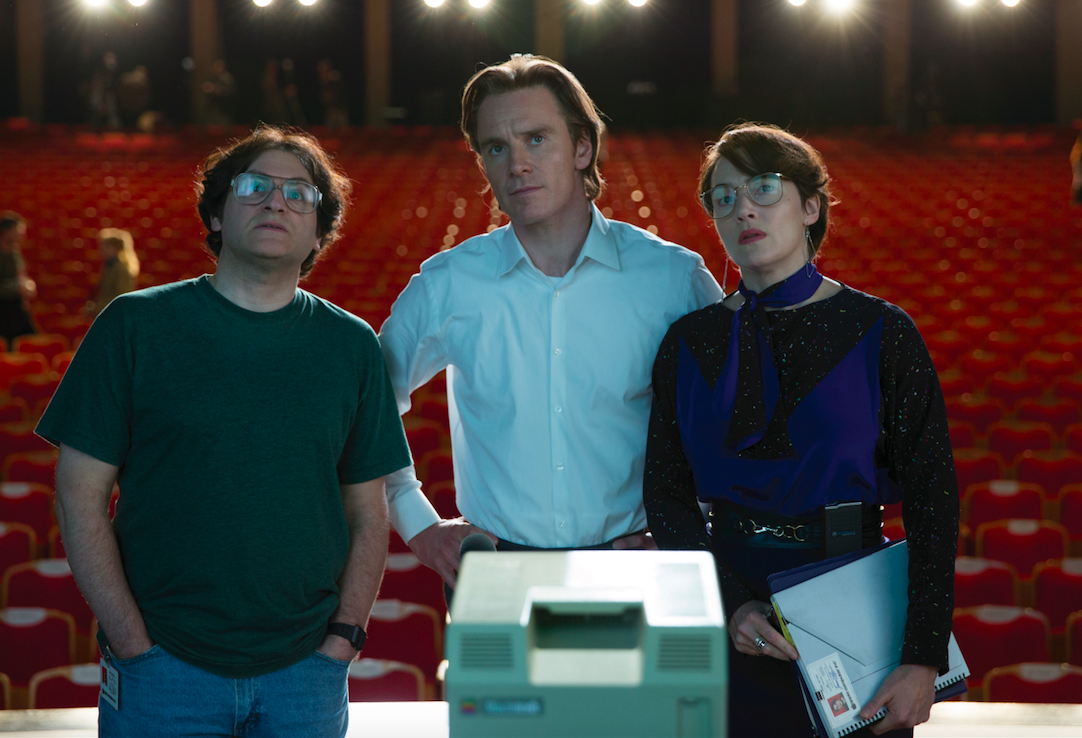
Michael and I would try things in rehearsal. We would know straight away that it wasn’t really going to work. We would soldier on for the 12 or 13 pages and then look at each other and go that was absolute shit; we would never do that on set. So it was very necessary to have that process, really, in particular for creating the energy that was required to keep up with the pace. What Aaron had written and handed to us, because the rhyme and the cadence, which Michael always talks about so eloquently, and I am going to hand this over to you in a second, the rhythm is absolutely built in. When there is a period mark it is there, when there is a pause you pause and not for too long. So yeah, over to you FassB.
Michael Fassbender: Yeah, I think it was exciting.
Sorkin: You didn’t always. My favorite moment at the very first table read – you know each of them at least at one point in the movie has a kind of long list of things to say. Michael, in one of his speeches where he says the 300 MHz processer is twice the speed of the 200 Intel, of this and that, he said it and then he just glanced up at me. On a break I went up to Jeff [Daniels] and I said listen, Michael’s a really big Irish guy and I think he is going to beat me up. Jeff, who had been doing this for three years already with The Newsroom, stared at me and said, 'I’m a really big Irish guy.'
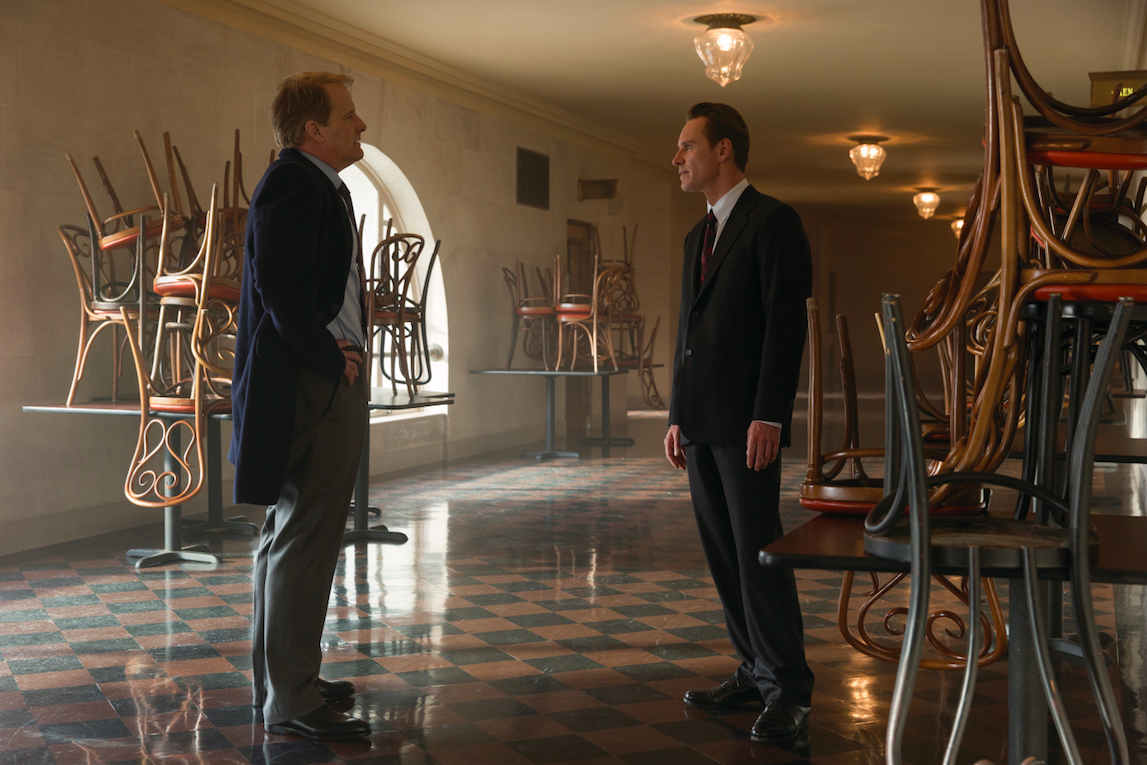
With a contemporary figure like Steve Jobs, Michael, did you have an opinion of him or personal perception of him going into the script. How did it change after you read it?
Fassbender: I didn’t really know much about him. Obviously I knew who he was, but I’m not very interested in technology. I use it pretty poorly, so everything was new to me, to be honest. I suppose the thing that really stuck with me was meeting people that knew him in his life through work. We got the opportunity to meet John Sculley, Joanna Hoffman, Steve Wozniak and Andy Hertzfeld. The one thing that stuck with me was how much of an impression he made on these people. Obviously when he was alive, but you know since he passed away you can see he is very much present in their lives. Even if the relationships were difficult, there was a sadness and a love there that I thought was pretty clear. That was something that stuck with me, even though you would hear the stories about him being a hard task master and obviously the relationship with John Sculley didn’t end well, I could really feel there was a love there for the man.
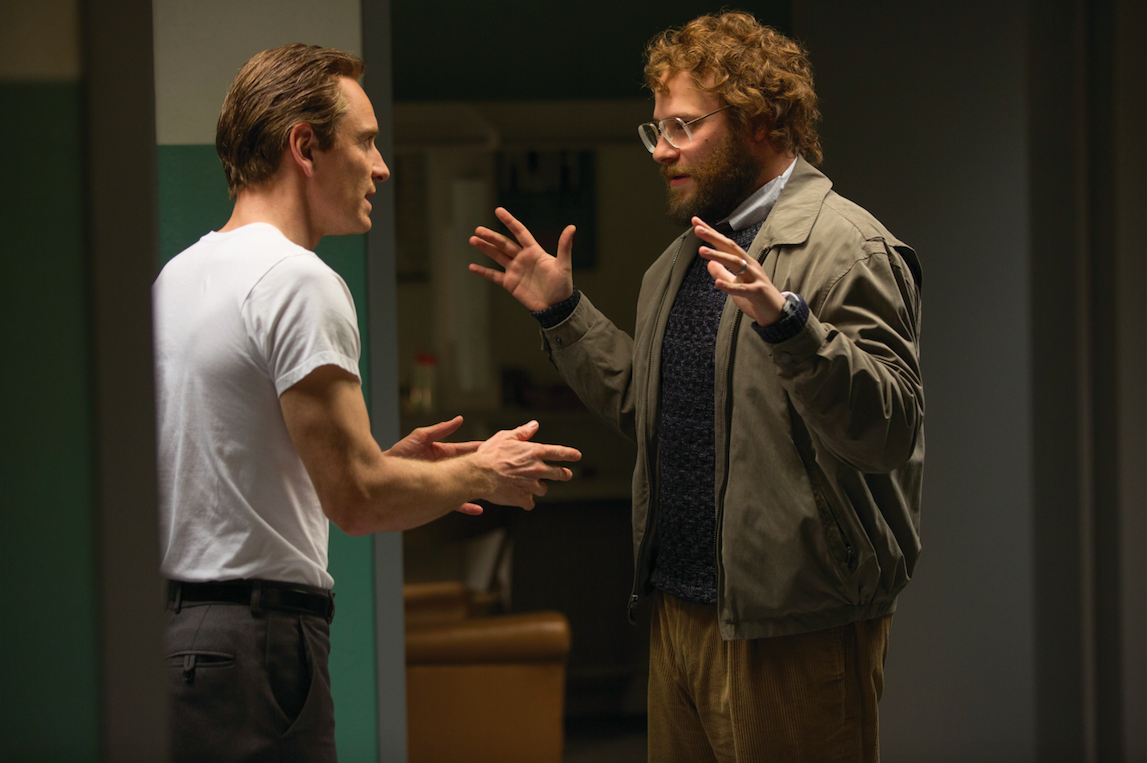
I want to pose a related question to all the other actors – did you all spend time with your real life counterparts?
Winslet: Yeah
Seth Rogen: Yup
Michael Stuhlbarg: Yeah – gosh he [Andy Hertzfeld] opened his whole life to all of us. He came in and spoke to all of us. I spent seven or eight hours with him just chatting about things. Later on in the process he invited me out to Palo Alto. I got to visit his house and meet his wife. We had food and just talked about Steve and talked about his experience working with him and the love they had for one another and the mutual respect and how challenging perhaps it might have been. He wanted to stay around Apple a little longer, but honestly, Steve didn’t have anything in particular he wanted Andy to do or work on. Andy went out and started other companies of his own. But Steve would constantly check in with him. He [Hertzfeld] was really generous with his time; I heard from him today, which was delightful. He remained for Steve sort of a moral center in a life that seemed quite complicated for Mr. Jobs. He was always there for him to check in with; he would periodically show up on his door step.
As a filmmaker, how important do you think it is to get it right? Aesthetically, look-wise, or do you think it is more important to bring the story to life, get the person and the message right.
Rogen: For me it was about making my boss, who was Danny, happy. You know, Woz wasn’t paying me. I was hired by these guys so they were the ones that I needed to please. If that happened to mean forget everything about Woz, it is better for the movie, I would be like that is totally cool with me because I don’t want to get fired and Woz can’t fire me. That was really my goal. I think in the end Woz was happy which is nice and I am happy that Steve Wozniak doesn’t hate me because that would be terrible. I think in the end accuracy isn’t necessarily creatively the thing that portrays someone the best.
Michael Fassbender: And I studied Ashton Kutcher (in Jobs.)
Rogen: I did too weirdly
Michael, did you give any thought to the rest of Steve Jobs life after the movie was over? You really embodied him so well. Did you think about if you had played him to the end what it would have been like?
Fassbender: Not really. I did think about him and I did watch footage of him past the point we were filming. I kind of lived with him for those months we were filming, from December to mid-April when we finished; every day was all about him. When we finished I kind of washed it all away to be honest. I was going onto another job and I just got sucked into that. I thought about so many things about the man, what he achieved, when he got ill how he would have dealt with that and how he could have dealt with it, how part of his reality distortion field got in the way in the end when he was diagnosed. But that was also the man who changed all of our lives because he believed he could change the universe and he did. All of these parts of the man were intrinsic from one to another. So yeah, I thought about him a lot. He didn’t leave me anyway because I was either reading the script or listening to YouTube clips of him, whether it be of the speech he gave at Stanford or when he was working on the NeXT Computer phase of his life or just the speeches he was giving. He was kind of in and around me the whole time, so I was actually rather quite happy to put him aside when I was finished to be honest.
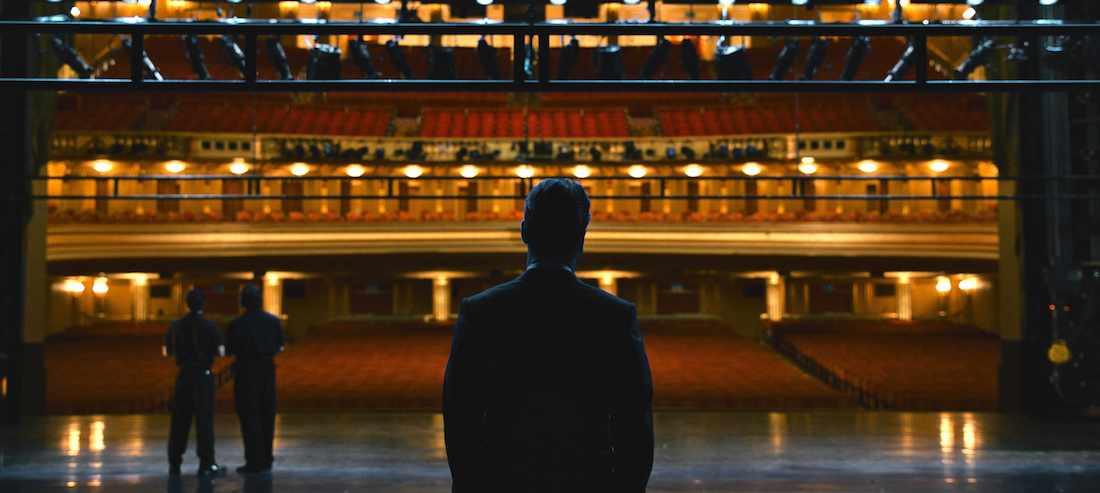
I thought it was really provocative and interesting the different approaches taken to all three different time periods. Whether it was the costume design, or the look of the film, or the grain and everything like that. What were the challenges and the interesting part of that?
Fassbender: You know obviously I don’t look anything like Steve Jobs. It sorts of comes back to what you [Boyle] were saying earlier. So that was the first thing that I said to Danny. Well you know Christian Bayle looks a whole lot more like Steve Jobs to me. He was like, 'I'm not interested in that. I sort of want to get the energy and the essence of the man and go with that.' So from the beginning the approach was to just not emulate that look, to copy that look. So the only thing I did was to put in brown contacts. But as we were going on through filming, I think it was somewhere through the second act with Suttirat (Larlarb, the costumer designer) and Ivana [Primorac], who was head of makeup and hair, she had amazingly gotten all these backup plans, we had wigs, we had the gray wig for the end. We were not sure if we were going to use that, but we had the option and so I think it was midway through the second act Danny and I started talking; let’s get the turtle neck and the jeans and the New Balance; I think the audience would want that, then the glasses and the sort of more iconic look. That just sort of happened and sort of developed as the third act came along. It was very organic.
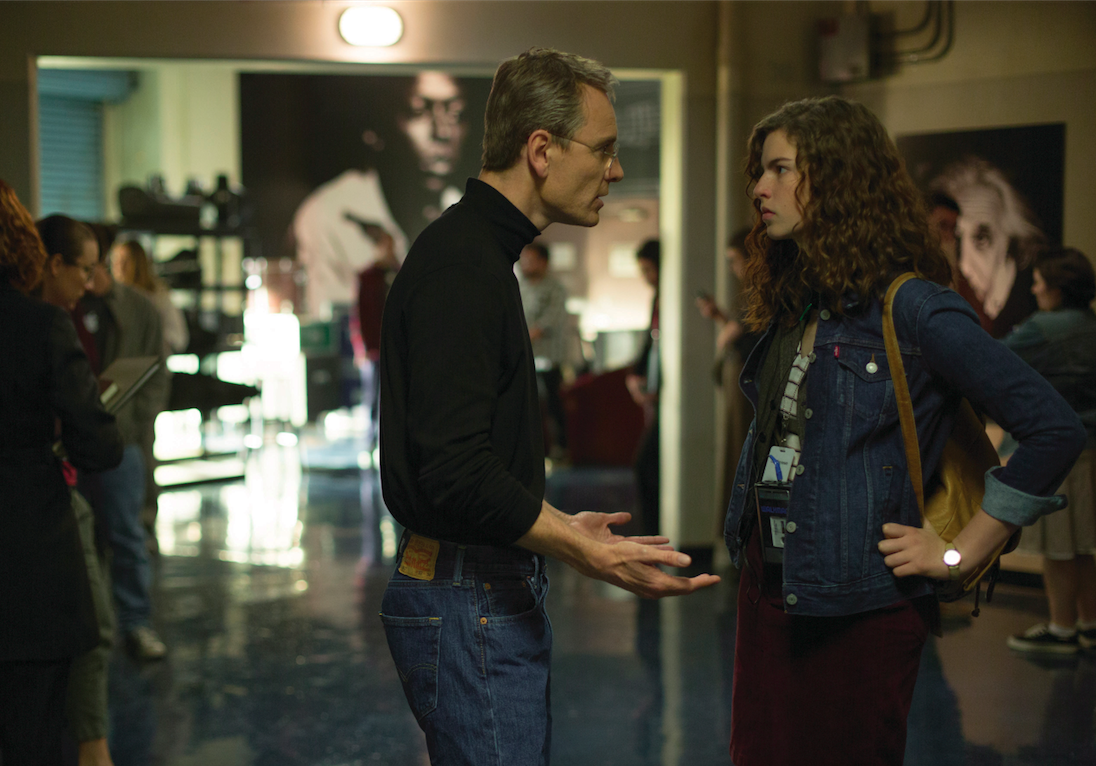
Winslet: Do you remember how happy you were, really happy? I remember that. Do you remember you saying sometime during Act Three; I remember Michael saying to me “I am really happy. I really feel like him now.”
Fassbender: Yeah it took that long, just as we finished. The last day I was like, 'Okay I get it.' Yeah, no I think I was happy in the third act because I didn’t have anything to learn in the evening. In the second act I was learning the third act; in the first act I was learning the second act. It all sort of all came together like that. We really worked against it obviously in the first and second and then it happened nicely in the third act as I say, organically.


